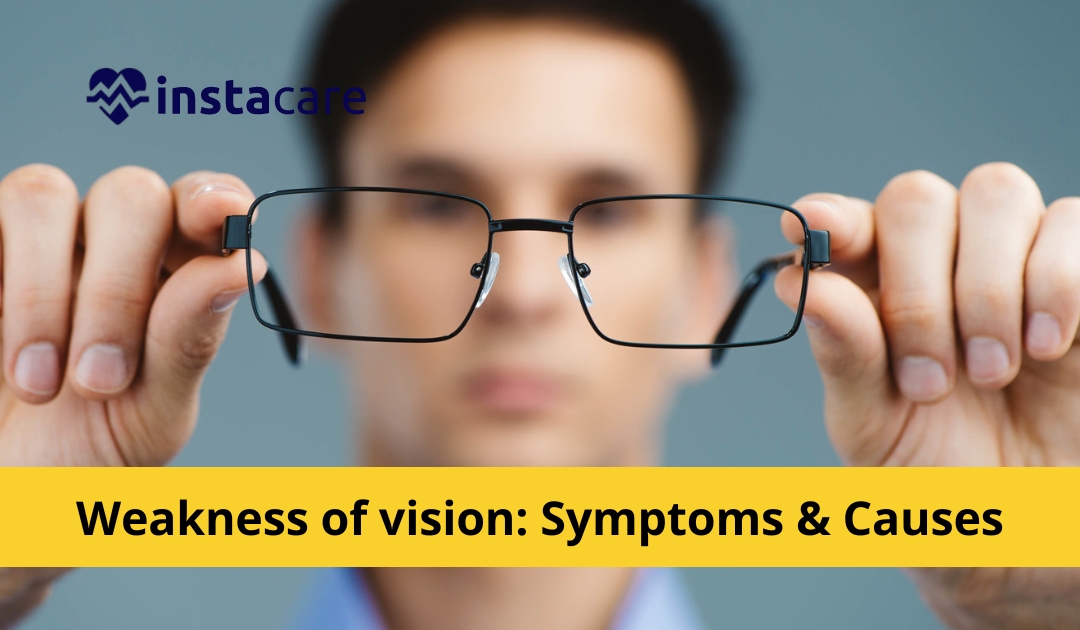Having a vision problem or weak eyesight could drastically change your lifestyle and affects not only how you see the world but also how well you will be able to do everyday tasks. If you’re experiencing frequent headaches, are having trouble seeing close up or far away objects, feel eye strain more quickly than usual, squint often, frequently have blurred vision - then it may be time to consider addressing any possible underlying condition causing these symptoms. In this blog post we'll talk about what causes weak eyesight and discuss some of the treatments available as well as home remedies that can help people manage – and even improve – their vision until they seek professional medical attention. Take a few minutes now to learn all about weakening of your vision today!
Low Vision
Low vision is a visual impairment that limits a person's ability to perform everyday tasks, ranging from completing school assignments and crossing the street to reading labels and facial expressions. Many people with low vision find their symptoms can be managed through treatments such as eyeglasses, magnifiers, special filters, or contact lenses. As well, technology has created devices to aid those who are visually impaired including closed circuit televisions (CCTVs) or portable video magnifiers that enhance natural vision by using its magnification feature. Talk with your optometrist today to determine what type of low vision treatment will work best for you!
What is the definition of low vision?
Low vision is defined as a visual impairment that cannot be corrected with standard glasses, contact lenses, medicine, or surgery. It can range from mild visual acuity loss to almost total blindness, and is typically characterized by inability to recognize faces, difficulty reading printed type of normal size, and incomplete sight of objects. People with low vision often experience fatigue due to their strained eyesight and may need longer than the average person to complete intellectual tasks or activities. By receiving timely diagnosis and treatment, the effects of low vision can be managed more effectively and those affected can lead more independent lives.
What is Eyestrain?
Eyestrain, or ocular fatigue, is a condition in which you experience distress or discomfort in your eyes. It may be caused by digital eyestrain from staring at too many screens, lengthy sight-intensive activities such as reading, writing, and crafting; weather factors like windy days and air pollution; reflections from environmental surfaces like water or snow; and lack of proper restful sleep. Symptoms of eyestrain can include eye fatigue, headaches, soreness in the neck, shoulders and/or back due to posture change due to looking down at a screen for extended periods of time, blurring vision and light sensitivity. To avoid eyestrain it's important to take regular breaks from any activity that involves weight strain on your eyes and to blink frequently when you look at screens so that your eyes don't dry out. Additionally make an effort to manage your environment by reducing glare throughout your day or using anti-blue light lenses when viewing digital devices.
Who is most at risk of having low vision?
Low vision can affect people of all ages, but is particularly prevalent in older individuals. Age-related macular degeneration, cataracts, and other eye diseases commonly deteriorate the eyesight of those over 60. Uncorrected refractive errors are also a major source of low vision in seniors, since routine vision tests may become less frequent as one ages. Unfortunately, individuals living in poverty or with limited access to healthcare are at significantly higher risk for having untreated visual impairments even at younger ages, which further increases their chances of developing permanent vision loss later in life. Ultimately, accurate diagnosis and treatment are key to mitigating the impacts of low vision.
What causes low vision?
Low vision can have a variety of causes, including congenital conditions, diseases, aging processes and eye injuries. Common chronic medical conditions that can lead to decreased visual acuity include diabetes, glaucoma and macular degeneration. Additionally, cataracts and corneal scars caused by infections or inflammation can further reduce visual clarity. Spending too much time in front of screens or staring into bright light sources without protection can also cause a person's vision to suffer over time. In some cases, low vision is caused by an ocular anomaly that develops at birth, such as retinopathy or albinism. If left untreated or not managed correctly, these conditions can lead to blindness; however, proactive monitoring and treatment may help to stabilize the patient's vision capabilities.
How is low vision diagnosed?
Low vision is diagnosed by an eye care professional. The doctor will review the patient's medical history, general health information, and visual acuity test results. During the physical examination, he or she may check how well the eyes move, how they respond to light stimuli, and how they change focus. Ophthalmologists may also perform additional tests to evaluate peripheral vision, depth perception, color vision, and contrast sensitivity during a low vision evaluation. Imaging scans such as optical coherence tomography (OCT) and electrophysiological tests can also provide more detailed information about potential causes of low vision. Ultimately, these findings can help determine an appropriate diagnosis and the best treatment plan moving forward.
View More: Top Effective Ways How To Improve Vision In 7 Days
Can low vision be treated?
Low vision can be treated with a variety of successful strategies and assistive devices. People with low vision can use magnifiers to make objects bigger, or they may be prescribed telescopic glasses that help them see better at specific distances. Non-optical aids such as large print books, talking products like clocks and thermometers and adapted writing tools can also help people living with low vision. Usually, a combination of these treatments and specialist guidance from an optometrist is the most effective way to successfully treat low vision.
Home remedies for low vision
Low vision is a difficult health issue to live with, but fortunately there are some home remedies that may be able to help improve your sight. Eating healthy foods, such as fruits and vegetables, can help you maintain good overall health, including your eyesight. Increasing your Omega-3 fatty acid intake can also be beneficial for low vision. Exercise is important to staying healthy and should include eye exercises, too. Put aside time each day for specific action designed to strengthen the muscles in the eye. Utilizing natural light where possible - when reading or doing other activities that require close attention - can mean a lot in helping to prevent eyestrain. Regularly cleaning and moisturizing your eyes while avoiding rubbing them will help preserve the quality of your vision. Taking the utmost care of yourself by following these simple home remedies can go a long way toward minimizing any obstruction to your sight from low vision.
Can low vision be prevented?
Low vision may be a difficult condition for those experiencing it, but fortunately, many cases of low vision can be prevented. While some cases are caused by inherited genetic conditions, which cannot be cured or prevented, others are the result of lifestyle factors or existing medical conditions. The best way to try to prevent low vision is to make sure that you lead a healthy lifestyle such as eating nutritious foods and exercising regularly. Additionally, regular checkups with an optometrist can help detect any developing eye problems at the earliest stages of development so that they can be treated right away. By taking small steps toward prevention like these, individuals can ensure they maintain their vision and decrease the chance that they will develop low vision in the future.
Conclusion
Though almost everyone experiences occasional vision problems, most of these are minor and temporary. If you experience weakness in your vision that lasts for more than a few days, however, it’s important to see an eye doctor to rule out any underlying conditions. With prompt treatment, most causes of vision weakness can be effectively managed so that you can maintain good vision and quality of life.
Please book an appointment with the Best ENT Specialist in Lahore, Karachi, Islamabad, and all major cities of Pakistan through InstaCare, or call our helpline at 02137136090 to find the verified doctor for your disease.






